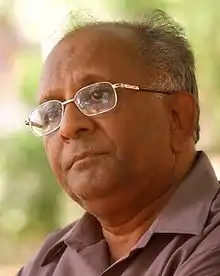Anil Joshi | |
|---|---|
 Joshi at Gujarat University, Ahmedabad, 2005 | |
| Native name | અનિલ રમાનાથ જોશી |
| Born | Anil Ramanath Joshi 28 July 1940 Gondal, Gujarat |
| Occupation | Poet, essayist |
| Language | Gujarati |
| Nationality | Indian |
| Education | Master of Arts |
| Alma mater | Gujarat University |
| Period | Modern Gujarati literature |
| Genres | Geet, Free Verse, Ghazal, Essay |
| Literary movement | Re Math |
| Years active | 1961 - present |
| Notable works |
|
| Notable awards | Sahitya Akademi Award (1990) |
| Spouse |
Bharati Joshi (m. 1975) |
| Children | Sanket (son) Rachna (daughter) |
| Signature | |
 | |
Anil Joshi (Gujarati: અનિલ જોશી) is a Gujarati language poet and essayist from Gujarat, India. He won Sahitya Akademi Award for Gujarati in 1990 for his essay collection Statue (1988).[1] His significant works include Kadach (1970; Collection of poems), Barafna Pankhi (1981; Collection of poems) and Pavan Ni Vyaspithe (1988; Collection of Essay).[2]
Early life

Joshi was born on 28 July 1940 in Gondal to Ramanath and Tarabahen. His father was a high level officer in education department. He completed his schooling in Gondal and Morbi. He completed his Bachelor of Arts in 1964 from U.N. Mehta Arts College, Morbi and H.K. Arts College, Ahmedabad with Gujarati and Sanskrit literature. He got his Master of Arts in 1966 from Arts and Commerce College, Modasa and School of Language located at Gujarat University, Ahmedabad.[2][3]
Joshi married Bharatiben on 15 July 1975, and they have a son and daughter, Sanket and Rachna.
Career

Initially he wanted to become a cricketer. He started his career as a teacher of Gujarati at My Own High School, Himatnagar in 1962. He served as a teacher at K.K. Parekh Vidyalay, Amreli from 1968 to 1969. From 1971 to 1976, he served as a personal assistant of Vadilal Dagli, an editor of Commerce. During 1976 to 1977, he worked as a co-editor at Parichay Trust. In 1977, he joined Language Development Project of Mumbai Municipal Corporation and served there till retirement as an Advisor of Gujarati language.[4]
It was 1962, when his poem Parigho (Circumferences) came out for first time in Kumar, a Gujarati literary magazine. He was associated with Re Math, a modernist literary movement in Gujarati. When his father was transferred to Amreli, he met Ramesh Parekh. They became very close friends.[3]
Works
Kadach (may be), his first anthology of poems, was published in 1970, followed by Ame Barafna Pankhi (1981) and Paniman Ganth Padi Joi (2012). He has worked in different genres of poetry such as Geet, Free Verse and Ghazals. But, he is mainly noted in Gujarati literature for his contribution in Geet. Statue (1988) and Pavan Ni Vyaspithe (1988) are two of his collections of Essays.[5]
Recognition
He won Sahitya Akademi Award for Gujarati in 1990 for his Essay collection Statue (1988).[1] He announced in October 2015 that he will return award over killing of rationalist M. M. Kalburgi and others.[6]
See also
References
- 1 2 "Gujarat-based writer Anil Joshi to return Sahitya Akademi award". Firstpost. 12 October 2015. Archived from the original on 12 May 2016. Retrieved 23 May 2016.
- 1 2 "સવિશેષ પરિચય: અનિલ જોશી, ગુજરાતી સાહિત્ય પરિષદ". Anil Joshi, Gujarati Sahitya Parishad (in Gujarati). Archived from the original on 4 March 2016. Retrieved 23 May 2016.
- 1 2 Brahmabhatt, Prasad (2010). અર્વાચીન ગુજરાતી સાહિત્યનો ઈતિહાસ - આધુનિક અને અનુઆધુનિક યુગ (History of Modern Gujarati Literature – Modern and Postmodern Era) (in Gujarati). Ahmedabad: Parshwa Publication. pp. 84–90. ISBN 978-93-5108-247-7.
- ↑ Topiwala, Chandrakant (1990). "Joshi Anil Ramanath". Gujarati Sahityakosh (Encyclopedia of Gujarati Literature) (in Gujarati). Vol. 2. Ahmedabad: Gujarati Sahitya Parishad. p. 136.
- ↑ Trived, Dr. Ramesh M. (2015). Arvachin Gujarati Sahityano Itihas (History of Modern Gujarati Literature). Ahmedabad: Adarsh Publication. pp. 349–350. ISBN 978-93-82593-88-1.
- ↑ "Another Gujarat-based writer Anil Joshi to return Sahitya Akademi award". dna. 12 October 2015. Archived from the original on 14 November 2015. Retrieved 24 May 2016.